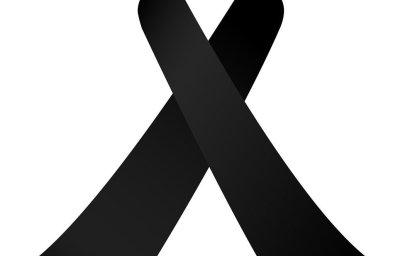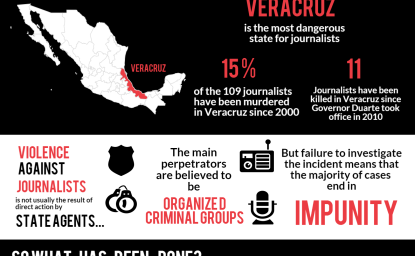La Impunidad Sigue: Violence against Journalists in Mexico
This Expert Take reflects on the death of Javier Valdez Cárdenas and discusses the broader issues related to violence against journalists and impunity in Mexico.
This Expert Take reflects on the death of Javier Valdez Cárdenas and discusses the broader issues related to violence against journalists and impunity in Mexico.

In yet another disturbing attack against freedom of expression in Mexico, one of the country’s most celebrated reporters, Javier Valdez Cárdenas, was shot and killed this week in his hometown of Culiacán, Sinaloa. The sixth journalist to be murdered in Mexico this year, Valdez was pulled from his car and shot multiple times by unidentified assailants around noon on May 15th, leaving the country to grieve the loss, again, of courageous journalist and rights defenders.
A talented and undeniably passionate reporter, Valdez won numerous international awards for his work. In 2011, the publication he co-founded, RioDoce, earned the prestigious Maria Moors Cabot Prize from the Columbia Graduate School of Journalism. In the same year, the Committee to Protect Journalists (CPJ) awarded Valdez the 2011 International Press Freedom Award for his fearless coverage of drug trafficking, organized crime, and corruption. “In a country where widespread self-censorship is the consequence of violence by drug syndicates and criminal gangs, Valdez still covers sensitive issues,” wrote CPJ in its announcement of the award.
The words Valdez delivered upon receiving the honor from CPJ in New York City are heart-wrenching. They underscore the horrors suffered by Mexicans living in areas ravaged by the country’s ongoing struggle against organized crime and the persistent challenges faced by journalists brave enough to report from the front lines of this struggle:
“Where I work, Culiacán, in the state of Sinaloa, Mexico, it is dangerous to be alive, and to do journalism is to walk on an invisible line drawn by the bad guys--who are in drug trafficking and in the government--in a field strewn with explosives. This is what most of the country is living through. One must protect oneself from everything and everyone, and there do not seem to be options or salvation, and often there is no one to turn to.”
While well aware of the risks, Valdez dedicated his life to addressing these pressing issues. In 2003, he co-founded the Sinaloa-based crime and corruption-focused publication RioDoce. At the time of the publication’s founding, the state government was believed to control most of Sinaloa’s media, and Valdez saw the need to provide more honest coverage of organized crime’s toll on Mexican society and governance.
In 2011, Valdez spoke at the Mexico Institute in the midst of Mexico’s rising homicide rates, discussing the risks faced by journalists reporting on organized crime. Widely considered the height of Mexico’s drug war, 2011 was the country’s most violent year on record, with nearly 23,000 homicides documented nationwide by the Mexican National Security System (SNSP). When asked by the Mexico Institute’s Eric L. Olson about why he continued reporting on such dangerous topics in such a hostile context, Valdez said, “The other option is to stay quiet and to turn a blind eye…I believe everyone must assume the responsibility given to them.”
Through his activism and dedicated reporting, Valdez called attention to Mexico’s incessant struggle to protect the right to freedom of expression. Press freedom watchdog Reporters Without Borders (RSF) consistently ranks Mexico the most dangerous country in the Western Hemisphere for the media, and according to international human rights organization Article 19, at least 100 journalists have been murdered in Mexico since 2000. In 2016 alone, the organization documented 426 total acts of aggression against the press, including 11 homicides.
Article 19’s 2017 report “Freedoms in Resistance” paints a troubling picture of who is responsible for the violence. While organized crime groups were behind 17 of last year’s 426 crimes against journalists, public officials are believed responsible for 226—more than 53 percent. Attacks were carried out by officials at all levels of government, especially those at the state level, who were allegedly responsible for 21 percent of last year’s attacks.
While these numbers themselves are alarming, what is most concerning is the culture of systemic impunity that allows organized crime groups and corrupt officials to silence their critics without fear of being prosecuted. Crimes against journalists are too often ignored and dismissed, and a lack of political will on behalf of the federal government to locate, investigate, and prosecute those responsible leave journalists alone in the fight to bring honest information to the Mexican people. By Article 19’s estimate, an astonishing 99.75 percent of acts of aggression against the media end in impunity, meaning less than 1 percent of aggressors are ever convicted.
Following the death of freelance journalist Anabel Flores Salazar in the southeast state of Veracruz last year, the Mexico Institute reported on the desperate need for more effective responses by the Mexican government to combat violence against journalists, calling attention to the various tactics used by authorities to skirt the responsibility of addressing these attacks: “A common response from state and federal judicial authorities to violence against journalists is to either blame the victim for ties to criminals or to allege that the crime had nothing to do with the journalist’s profession but rather with a personal conflict.” Indeed, in Flores’s case, the attorney general’s office released a statement the day of her abduction that accused Flores of having ties to an organized crime group. When CPJ later reported on Flores’s death, the organization denounced this claim, saying that it had “documented several cases in which Veracruz authorities have made unfounded accusations linking murdered journalists to criminals” in an effort to “minimize any relationship between the murders and the journalistic work of the victims.”
While the federal government has taken concrete steps to put systems in place to protect journalists, like creating a Special Prosecutor’s Office for Crimes against Journalists (FEADP) in 2006, a Special Prosecutor’s Office on Crimes Committed against Freedom of Expression (FEADLE) in 2010, and the Mechanism to Protect Human Rights Defenders and Journalists in Mexico in 2012, media workers remain vulnerable to violence without justice. Over the past seven years, FEADLE has examined more than 800 cases of serious alleged crimes against journalists, but only two have ended in conviction.
On May 4, a delegation from CPJ visited Mexico City to urge Mexican authorities “to break this murderous cycle and ensure that journalists under threat will be protected.” At the meeting, Mexican President Peña Nieto recognized the shortcomings of the judicial system in prosecuting crimes against journalists. “We need to consolidate the new justice system, but this is not an excuse,” he said. In a hopeful vow to step up protections for the press, Attorney General Raul Cervantes Andrade announced plans to replace FEADLE's lead prosecutor, Ricardo Nájera, “with someone experienced who will have the support and recognition of [freedom of expression] organizations.”
These promises provide a glimmer of hope at a dark time for Mexico. Freedom of expression and freedom of information are essential elements of democracy. When submitting to criminals’ and corrupt officials’ demands are the only way to survive in Mexico, journalists turn to self-censorship to protect themselves when the government cannot or will not do so. Reporters stop covering the issues most relevant to the safety and well-being of the Mexican people, threatening citizens’ access to honest and quality information, limiting public debate, and allowing crime and corruption to flourish.



The Mexico Institute seeks to improve understanding, communication, and cooperation between Mexico and the United States by promoting original research, encouraging public discussion, and proposing policy options for enhancing the bilateral relationship. A binational Advisory Board, chaired by Luis Téllez and Earl Anthony Wayne, oversees the work of the Mexico Institute. Read more



